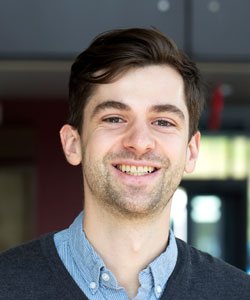A magnetic resonance imaging (MRI) scan is a non-invasive medical procedure that uses a magnetic field and radio waves to create images of the human body’s organs and tissues.

Greg Ongie, Ph.D., University of Iowa, says MRI imaging, however, is limited by the speed in which images are acquired and the number of measurements that are taken of the specific organ/tissue.
In his dissertation, Ongie developed an algorithm for accelerated MRI reconstruction based on a new mathematical model of images.
“You are limited in how many measurements you can take due to physics. We are trying to work around that by building mathematical models of what the images should look like,” Ongie says. “I’ve been working on how to implement these mathematical models efficiently on a computer, so you could run them in a reasonable amount of time. The goal is to have an expressive mathematical model of what the image should look like and a fast computational method to implement that model.”
The Graduate College awarded Ongie with the D.C. Spriesterbach Dissertation Prize in Mathematical and Physical Sciences and Engineering for his dissertation, “Off-the-grid Compressive Imaging.” Ongie, who earned his doctorate in applied mathematical and computational sciences at the University of Iowa in 2016, will be honored during a ceremony at the James F. Jakobsen Graduate Conference in March 2019.
UI Associate Professor Mathews Jacob says Ongie’s dissertation has had a practical impact in a variety of biomedical imaging applications, including MRI, optics, and ultrasound.
Jacob, who was Ongie’s advisor, says his former student’s dissertation work has been referenced and in some cases extended by researchers in the imaging community at the University of Iowa, University of Southern California, and internationally in South Korea.
“I am truly impressed by the depth, originality, and quality of Greg’s dissertation work,” Jacob says.
Ongie adds it will take time for radiologists and MRI technicians to incorporate an algorithm like his into a clinical setting. He says radiologists first want to know what they’re seeing is accurate.
Currently a postdoctoral scholar in the Department of Statistics at the University of Chicago, Ongie has shifted his research area to machine learning, which uses statistical techniques to give computer systems the ability to work with data to improve performance on a specific task.
“I wanted to learn more about that field and where it’s going, because I feel like it’s the future of medical imaging,” Ongie says.